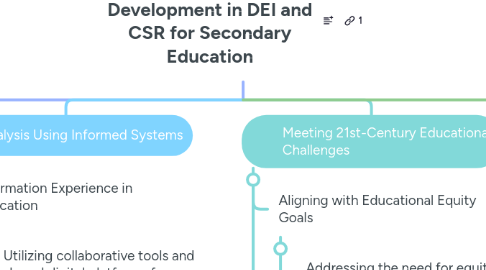
1. Current Professional Development Opportunities
1.1. DEI Training for Educators
1.1.1. Workshops on culturally responsive teaching, implicit bias training, and strategies for promoting equity in the classroom. These programs aim to create an inclusive learning environment that reflects the diversity of the student population (Rice University, 2019).
1.2. CSR Initiatives in Education
1.2.1. Programs that integrate environmental sustainability and community engagement into the curriculum, encouraging educators to teach these values to students (Barboza et al., 2022).
1.3. Leadership Development Programs for Literacy Coaches and Administrators
1.3.1. Training that emphasizes ethical leadership, promoting a culture of inclusivity, and strategic planning to address literacy gaps in diverse student populations (Spickard, 2017).
1.4. Sustainability Initiatives for Schools
1.4.1. Educator workshops on implementing sustainability practices within schools, such as reducing waste and promoting environmental stewardship among students (Barboza et al., 2022).
2. Analysis Using Informed Systems
2.1. Information Experience in Education
2.1.1. Utilizing collaborative tools and shared digital platforms for continuous learning in DEI and CSR, promoting a culture of shared knowledge among educators (Somerville et al., 2019).
2.2. Collective Learning and Teacher Collaboration
2.2.1. Encouraging collective action and peer collaboration to ensure that DEI and CSR principles are integrated across all teaching practices (Somerville et al., 2019).
2.3. Systems Thinking in Education
2.3.1. Integrating DEI and CSR initiatives into the district’s overall strategy, addressing the complex needs of a diverse student body through a systemic approach (Somerville et al., 2019).
3. Meeting 21st-Century Educational Challenges
3.1. Aligning with Educational Equity Goals
3.1.1. Addressing the need for equitable access to resources and support for all students, particularly in underserved communities (Somerville et al., 2019).
3.2. Adapting to Changing Student Demographics
3.2.1. Professional development aimed at helping teachers adapt to the increasingly diverse student population and their unique educational needs (Rice University, 2019).
3.3. Integrating Technology in Professional Development
3.3.1. Utilizing online platforms and digital tools to deliver DEI and CSR training to all educators, making these programs accessible to teachers across the district (Somerville et al., 2019).
4. Gaps and Opportunities in Professional Development
4.1. Lack of Continuous Learning in DEI and CSR
4.1.1. Need for ongoing, district-wide training programs that reinforce DEI and CSR values throughout the academic year (Rice University, 2019).
4.2. Insufficient DEI Implementation in Curriculum Planning
4.2.1. Integrating DEI principles into curriculum development and lesson planning to ensure all students are represented and supported (Barboza et al., 2022).
4.3. Limited Professional Development for Remote and Hybrid Educators
4.3.1. Offering more flexible, online training options for teachers who work in remote or hybrid environments (Rice University, 2019).
